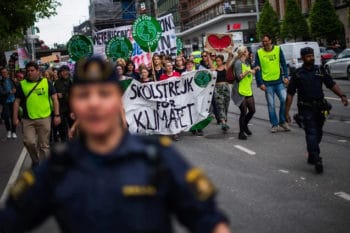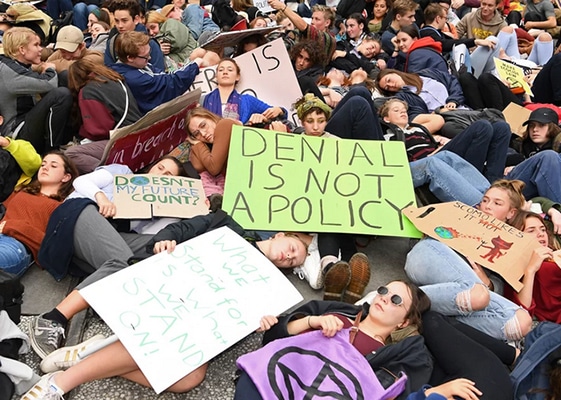Hundreds of thousands of students around the world walked out of their schools and colleges Friday in the latest in a series of strikes urging action to address the climate crisis. According to event organizers Fridays for Future, over 1664 cities across 125 countries registered strike actions, with more expected to report turnouts in the coming days.
The “School Strike for Climate” movement was first started by Swedish teenager Greta Thunberg, who began her strike outside the country’s parliament in Stockholm in August 2018 and has said that she will continue to strike until Sweden is aligned with the goals of the Paris Agreement. Since then, her singular action has spread into an international climate movement, organized by young people around the world. This strike followed the last co-ordinated event on March 15, which saw over 1.6 million people across 133 countries turn out at demonstrations according to organizers.
Thunberg was recently profiled on TIME’s global cover as a Next Generation Leader, along with nine other people shaping the world’s future. “This is not about truancy or civil disobedience, this is about the climate and the ecological crisis, and people need to understand that,” Thunberg told TIME in Stockholm, a couple of weeks ahead of the global strike.
“May 24 is the last chance to affect the E.U. elections. Politicians are talking about the climate and environmental issues more now, but they need more pressure,” she said. Voting across the European Union takes place May 23-26, where the 751 representatives of the European Parliament will be elected by citizens across the continent. Recent polling suggests environmental issues and policies tackling climate change are high on the agenda for voters considering who to elect.
Stockholm right now. #FridaysforFuture #SchoolStrike4Climate pic.twitter.com/S63wZMWTyq
— Greta Thunberg (@GretaThunberg) May 24, 2019

Greta Thunberg (2ndL behind the banner), the 16-year-old Swedish climate activist, marches during the “Global Strike For Future” movement on a global day of student protests aiming to spark world leaders into action on climate change in Stockholm, Sweden on May 24, 2019. Jonathan Nackstrand—AFP/Getty Images
The school strike movement has emerged in tandem with other environmental movements worldwide. The British-based direct action group Extinction Rebellion occupied major locations in London for ten days in late April, and their first demand, for the British government to declare a state of “climate emergency,” received approval from parliament on May 1. And in the U.S., the young activists of Sunrise Movement have pushed to transform climate action into a political reality by calling for a Green New Deal, attracting the support of several legislators and 2020 Democratic presidential candidates.
While Thunberg is well-known worldwide, she says it is the strike organizers in each country that she looks up to. “Young people who are in developing countries are sacrificing their education in order to protest against the destruction of their future and world,” she told TIME. “They are the real heroes.” Photos and videos from strikers in the eastern hemisphere started flooding social media in the morning, ranging from Seoul, South Korea to Auckland, New Zealand, and later in the day images of crowds surfaced in European cities such as Berlin and Paris, where organizers say an estimated 23,000 turned out to demonstrate.

Greta Thunberg, the 16-year-old Swedish climate activist, is interviewed ahead of the “Global Strike For Future” movement on a global day of student protests aiming to spark world leaders into action on climate change in Stockholm, Sweden on May 24, 2019. Jonathan Nackstrand—AFP/Getty Images
Here is a look at some of the places around the world where young people are taking action on May 24.
Sweden
Thousands of students and young people took part in Friday’s strike marching through the streets of Stockholm. When TIME travelled with Thunberg from London to her hometown in April, she and other young organizers from the Fridays for Future movement were planning and preparing the actions for May 24.
“I’m just going to continue school striking every Friday until Sweden is aligned with the Paris Agreement,” Thunberg told TIME.
It will not take weeks, it will not take months: It will take years, most likely and unfortunately.
While there’s an acknowledgement that the strikes have placed the climate crisis back on the agenda in Sweden, for Thunberg it is not enough—her focus is on the global carbon emissions, which continue to rise. However, in the nine months since she first started her strike, her cause has galvanized support from a wide cross section of Swedish society, with grandparents and scientists turning out to support the strike on May 24.
…

